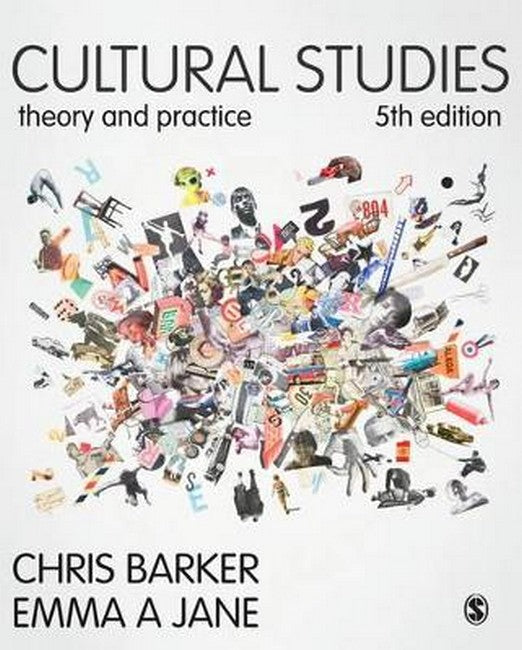Chris Barker is a teacher and researcher with over 25 years experience. He has worked in a number of schools and universities in both England and Australia. He is currently Associate Professor of Cultural Studies at the University of Wollongong, NSW, Australia. Chris is the author of six previous books that are linked together by an interest in culture, meaning and communication. At present he is exploring questions of emotion in contemporary cultural life. Emma A. Jane is a Senior Research Fellow in the School of the Arts and Media at the University of New South Wales, Australia. She is currently involved in two major research projects: one on gendered cyberhate, and another on the ethics of cognitive enhancement or 'smart drugs'. Prior to commencing her academic career, Emma spent nearly 25 years working in the Australian print, electronic, and on-line media. She has written seven previous books including a novel, Deadset, which won the Commonwealth Writers' Prize for Asia and the South Pacific for Best First Novel in 1997.
Request Academic Copy
Please copy the ISBN for submitting review copy form
Description
PART ONE: CULTURE AND CULTURAL STUDIES Chapter 1: An Introduction to Cultural Studies Concerning this Book The Parameters of Cultural Studies Key Concepts in Cultural Studies The Intellectual Strands of Cultural Studies The New Cultural Studies Project Central Problems in Cultural Studies Questions of Methodology Chapter 2: Questions of Culture and Ideology Culture with a Capital C: The Great and the Good in the Literary Tradition Culture is Ordinary Richard Hoggart: The Uses of Literacy Edward Thompson: The Making of the English Working Class Raymond Williams and Cultural Materialism High Culture/ Low Culture: Aesthetics and the Collapse of Boundaries Culture and the Social Formation The Question of Ideology Chapter 3: Culture, Meaning, Knowledge: The Linguistic Turn in Cultural Studies Barthes and Mythology Derrida: Textuality and Differance Foucault: Discourse, Practice and Power Post-Marxism and the Discursive Construction of the 'Social' Language and Psychoanalysis: Lacan Language as Use: Wittgenstein and Rorty Discourse and the Material Chapter 4: Biology, the Body and Culture The Problem of Reductionism The Capabilities of Science The Cultured Body Genetic Engineering The Evolved Body of Biology Evolutionary Culture Biology and Culture: The Case of Emotions Meme Theory PART TWO: THE CHANGING CONTEXT OF CULTURAL STUDIES Chapter 5: A New World Disorder? Economy, Technology and Social Class Globalization The State, Politics and New Social Movements Chapter 6: Enter Postmodernism Defining the Terms Modernism and Culture Modern and Postmodern Knowledge The Promise of Postmodernism (or Modernity as an unfinished Project?) Postmodern Culture After Postmodernism PART THREE: SITES OF CULTURAL STUDIES Chapter 7: Issues of Subjectivity and Identity Subjectivity and Identity The Fracturing of Identity Agency and the Politics of Identity Anti-Essentialism, Feminism and the Politics of Identity Chapter 8: Ethnicity, Race and Nation Race and Ethnicity National Identities Diaspora and Hybrid Identities Race, Ethnicity and Representation Chapter 9: Sex, Subjectivity and Representation Feminism and Cultural Studies Sex, Gender and Identity Sexed Subjects Men and Masculinity Gender, Representation and Media Culture Chapter 10: Television, Texts and Audiences Television Today Television as Text: News and Ideology Social Media and News Reporting Television as Text: Soap Opera as Popular Televsion Television Storytelling in the Twenty-First Century The Active Audience Television Audiences and Cultural Identity The Globalization of Televsion Global Electronic Culture When TV isn't on Television Chapter 11: Digital Media Culture A Digital Revolution Digital Media 101 Digital Divides Cyberspace and Democracy The Cultural Politics of Information The Global Information Economy Chapter 12: Cultural Space and Urban Place Space and Place in Contemporary Theory Cities as Places Political Economy and the Global City The Symbolic Economy of Cities The Postmodern City Cyberspace and the City The City as Text Chapter 13: Youth, Style and Resistance The Emergence of Youth Youth Subcultures Youthful Difference: Class, Gender and Race Space: A Global Youth Culture? Global Youth Online After Subcultures Creative Consumption Resistance Revisited Digital Youth Culture Chapter 14: Cultural Politics and Cultural Policy Cultural Studies and Cultural Politics Cultural Politic: The Influence of Gramsci The Cultural Politics of Difference Difference, Ethnicity and the Politics of Representation Difference, Citizenship and the Public Sphere Questioning Cultural Studies The Cultural Policy Debate Neo-Pragmatism and Cultural Studies GLOSSARY

